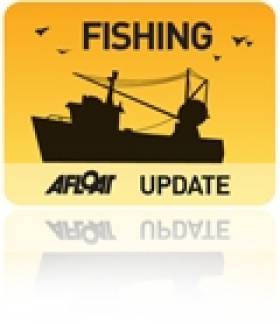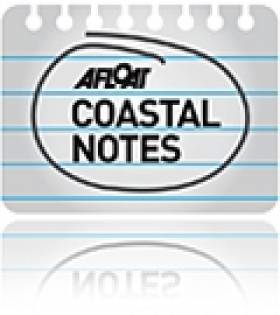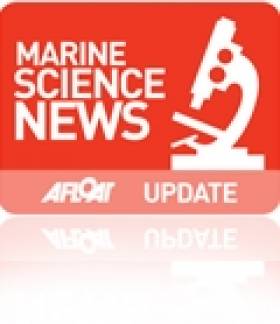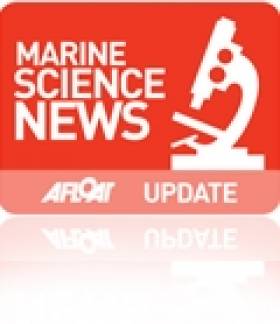Displaying items by tag: Technology
Smart Ring Buoys Launched by Dublin City Council to Save Lives and Improve Water Safety
Dublin City Council, in partnership with Water Safety Ireland and the Department for Rural and Community Development, this week launched an innovative ‘Smart Ring Buoys’ project aimed at saving lives in Ireland’s waters.
The Smart Dublin initiative worked with technology partners Civic Integrated Solutions Ltd, mSEMICON Teoranta and ZiggyTec Ltd to develop the low-cost lifesaving technology, which will provide real-time alerts when life rings are stolen or tampered with.
Anti-social misuse of life buoys is an issue for councils across Ireland, and more than 600 sensors will now be installed in eight local authorities including Fingal County Council, Dun Laoghaire-Rathdown County Council, South Dublin County Council, Dublin City Council, Laois County Council, Meath County Council, Sligo County Council and Limerick City & County.
The Smart Ring Buoy technology works through low-cost sensors paired with a mobile, map-based platform with real-time monitoring. It will alert water safety officers when ring buoys are tampered with or go missing and ensure their timely replacement. This is an essential and lifesaving action as a stolen ring buoy could mean a stolen life.
Minister for Rural and Community Development, Heather Humphreys said: “In 2021 alone, we tragically lost 80 lives through drowning. Such incidents have devastating and long-lasting effects on families and communities.
“Safety tools like ring-buoys are in place to save lives and protect people when they are close to water. Sadly, the theft or vandalism of this life saving equipment is still commonplace in both our rural and urban communities.
“The initiative that I am launching today [Wednesday 26 October] in conjunction with Dublin City Council is both unique and important. With the support of funding from my department’s Digital Innovation Programme, we will roll out this sensor technology in 8 different local authorities.
“This project is a leading example of how the public sector is tacking community challenges with innovative approaches. I want to commend Dublin City Council and all the project partners and stakeholders involved.”
The project began back in 2018 as part of a workshop to identify challenges in Dublin’s Smart Docklands area. Members of the community highlighted that ring buoys were frequently being stolen or tampered with, with a delay to replacement devices being installed.
‘These smart ring buoys will detect when this essential public rescue equipment is interfered with or stolen’
At present, around 15 ring buoys go missing or are stolen every week from Dublin City Council alone costing over €20,000 per annum for replacement.
Dublin City Council says it realised that this was a problem not just in Dublin but across Ireland and set out to find a solution through its Smart Dublin innovation programme. Across Ireland there are approximately 5,000 life buoys installed.
The project has taken what’s described as a “unique” approach to procurement in an Irish context, led by Dublin City Council, where the Dublin local authorities have been able to pilot a number of innovative solutions initially and then purchase the best solutions as part of a wider framework with 23 local authorities.
In addition, the project was shortlisted for an Innovation leadership award from the European Innovation Council, recognising the efforts done by the public sector to promote and implement innovation procurement across Europe.
Speaking about the new scheme, Dublin City Council chief executive Owen Keegan said: “This is a great example of collaboration across the Irish local authorities and Water Safety Ireland through our Smart Dublin programme. It is also the first time we have used a procurement approach like this to pilot an innovative technology solution before we buy.
“We look forward to scaling this type of approach to accelerate the deployments of new innovations that can address city challenges.”
Roger Sweeney, acting CEO of Water Safety Ireland said: “Every year, ring buoys are used by the public to save lives from drowning however many ring buoys are regularly stolen or vandalised. A stolen ring buoy can mean a stolen life. Ring buoys play a critical role in drowning prevention but to do so they must always be available and in place.
“These smart ring buoys will detect when this essential public rescue equipment is interfered with or stolen. They will save on the time that is currently needed to monitor and replace them and they will provide this information 24 hours a day.
“The increased number of visitors to our waterways nationwide has placed a greater emphasis on the need for such innovative water safety solutions that can help prevent tragic drownings. Water Safety Ireland is delighted to be involved in this project which will help save lives.”
Ending Fish Discards Requires New Technologies - Damanaki
#Fishing - Key to proposals to end fish discards in this year's reform of the Common Fisheries Policy (CFP) is the introduction of new technology like wheelhouse cameras and 'smart nets'.
So argues EU Fisheries Commissioner Maria Damanaki, as BBC News reports on trials of new net designs that can separate fish catches and reduce damage to the seabed.
One of the fishing net innovations involves a bendable plastic grid attached to the middle of a trawl net that allows smaller fish and juveniles to pass through while snaring the valuable larger catch.
Another design, the Rollerball net, attempts to eliminate the problem of heavy trawling gear churning up debris on the sea floor while reducing drag and saving on boats' fuel bills.
Assuaging concerns over the prohibitive costs for fishermen, Damanaki says she hopes that such 'smart nets' will be subsidised by as much as 85% - while emphasising that the adoption of new technology could mean the difference between being allowed to fish or being banned from the ocean.
Wheelhouse CCTV cameras are another method that has been shown to reduce discards to less than 1% in some cases - and Damanaki says they will be essential if the CFP reforms indeed include a zero tolerance policy on fish discards.
BBC News has much more on the story HERE.
What Happened to the Lusitania?
American Gregg Bemis is headed to Ireland for what may be the last major dive to the wreck of the Lusitania.
Bemis, who owns the wreck of the former Cunard cruise liner torpedoed off the Cork coast in 1915, told The Irish Times that hopes to discover once and for all what was in the cargo hold of the ship - and give an answer to rumours that precious art and munitions were part of the manifest.
The millionaire has fought with the Irish State over the rights to the wreck site, to which he has dived twice before, but now he has full licence and access to the latest technology to unveil the Lusitania's deepest secrets.
The Irish Times has more on the story HERE.
Marine Sector is Key to Ireland's Future Says President
Marine scientists yesterday welcomed President Mary McAleese on a visit to the Marine Institute headquarters in Oranmore, Co Galway.
The President met many of those involved in the SmartBay project, a network of buoys that uses remote sensing technology to collect and relay data on ocean conditions over long distances.
Institute staff also briefed the President on its programmes to sustainably manage wild fish stocks, ensure seafood safety and protect the marine environment.
“As the resources of the ocean become ever more implicated in the future development of high technologies sectors like energy, ICT, medical and pharma, they will be a key part of Ireland’s future economic story,” said the President.
Dr Peter Heffernan, CEO of the Marine Institute, also highlighted "Ireland’s reputation as an emerging centre of excellence in marine science".
He said this was "validated" by the announcement of €23 million in EU funding for marine research groups and enterprises involved in pioneering areas such as ocean energy and biotechnology.
‘Follow the Fleet’ Essay Competition Reminder
Schools can register details by logging on the webite where a username and password will be provided. All details with essay guidelines, entry forms and competition details and rules are available on www.imdo.ie/followthefleet/news.asp
Galway Atlantaquaria Nets Second Education and Outreach Award
Galway Atlantaquaria who, with the Marine Institute, Forfas Discover Primary Science and others are partners in the Explorers marine education and outreach programme, have achieved their second prestigious award - Best Education Project : Public and General Visitor 2010 - from the Britain and Ireland Association of Zoos and Aquaria (BIAZA) for their marine education and outreach activities.
The award, was presented at Paignton Zoo Environmental Park, Devon by Adrian Sanders MP and was given for the "Galway Marine Month of Madness" event, organised by the Atlantaquaria with help from the other Explorers partners during the month of May this year.
Speaking for the Atlantaquaria, Marketing Executive Colette Lavin said that the award was a tribute not only to the Atlantaquaria but to all those involved in the month-long celebration. "A lot of people put a lot of heart and hard work into the individual events that made up the Month of Marine Madness," she said. "And while this second BIAZA award is the most tangible benefit of all this, I really believe that the biggest reward for all our efforts is the raised awareness of the value of our oceans and seas, not only to Galway, but to the rest of the country."
The calendar of events was launched by Galway's Deputy Mayor Mr. Peter Keane at Salthill beach and events arranged during the Month of Marine Madness ranged from seashore safaris, diving lessons, scientific lectures, nature walks and angling demonstrations, to a series of free seminars at the Atlantaquaria on such subjects as Baleen Whales, Slimy
Seaweed, the value of outdoor education, and Pirates! The First Entrepreneurs. A highlight of the calendar was the 'Largest Beach Clean Up in Ireland' which took place on Sunday 18th of May. Over 2,000 members of the public took part in the various events which included a tour of the national research vessel RV Celtic Explorer by 280 pupils from local primary schools.
Speaking for the Explorers Programme, Dr. John Joyce of the Marine Institute said that the effort put in by Colette and her team had raised awareness of the sea to a whole new level in Galway during the month of May. "While Explorers is targeted primarily at raising awareness of the sea in schools, Colette and the Galway Atlantaquaria have shown us how we can raise that awareness to a whole new level by reaching out into the wider community. Last year, the Volvo Ocean Race vividly demonstrated the value of the sea to Galway in terms of tourism revenue. Clearly, the way is open to build on that awareness
and to use our creativity in finding new ways that Galway can profit - financially, educationally and environmentally – from marine related events."
Galway Atlantaquaria, the Marine Institute and the other partners in the Explorers programme celebrated the launch of National Science Week on Sunday 7th November with a Sunday Funday entitled "Our Plaice in Space" to celebrate the connections between outer and inner space.
Later in the month, on November 21st, the Explorers Programme will be present at the Galway Science and Technology Festival in NUI Galway.



























































